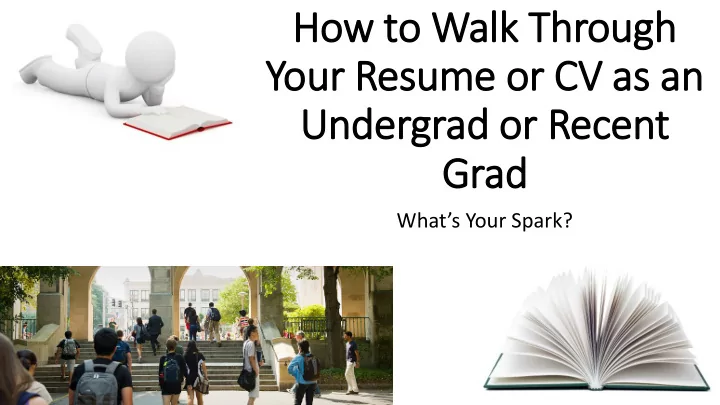

How to W Walk Through Your Resume or CV as an Undergrad or Recent Grad What’s Your Spark?
This Lesson: Read OR Watch It This video walks you through the key points of our undergrad/recent grad templates… …but it’s not really “essential,” since you can just look at the templates, examples, and explanations there as well. Or download these slides!
Tell lling Your Story ry as an Undergrad or Recent Grad • Part 1: Why You Need a Progression of Internships • Part 2: The Main Idea Behind All These Templates • Part 3: What to Expect with Different Backgrounds • Part 4: What If Your Background Doesn’t Match?
Part 1: Why You Need a Progression of Internships • REALITY CHECK: You will not win an IB internship or full-time offer without a series of previous internships, or at least one • Typical Progression: Wealth management, Big 4, and then a boutique investment bank • OR: Small consulting firm or normal company to small PE/VC firm to investment bank • Liberal Arts or Engineering Background: Doesn’t matter Can’t just walk in and say, “I changed my mind! I have no internships!”
Part 1: Why You Need a Progression of Internships • WHY: The market has become far more competitive, even if you’re at a target school, and banks need to see more commitment • No Internships: Start small and think about boutique firms, wealth management, and other options first, before IB • For Those: Your “story” doesn’t matter as much if it’s your first or second internship; can make it much simpler and focus on what interests you about the field
Part 2: The Main Idea Behind All These Templates • Here: Five templates for different backgrounds: • Liberal Arts to Investment Banking • Engineering/Technical Major to Investment Banking • Finance, But Non-IB to Investment Banking • Finance and IB Experience to Investment Banking • Consulting to Investment Banking • LOGIC: We reviewed hundreds of sample stories from clients and readers and found the commonalities • Reality: There’s an infinite number of backgrounds/majors – but there are also some patterns that come up again and again…
Part 2: The Main Idea Behind All These Templates • Progression: First, you got interested in finance, then investment banking, and now you want to combine your major or previous background with IB • Main Difference: How far away from IB/finance do you start off? • Why: That “distance” tells you how much you need to prove, and how much time you need to spend handling the objections • EXAMPLE: You have more to prove if you’re a Liberal Arts major and you only have non-IB finance experience; less to prove with PE and IB internships at smaller firms
Part 2: The Main Idea Behind All These Templates • Consolidation is critical – you can’t go on for 5 minutes talking about 6 different internships! • Multiple Internships: Group them together, and make your transition into IB more about “those internships” to a recent one that’s more relevant, and now why you want to do banking • Example: Did several “consulting internships,” but wanted more quantitative work with clients, so went to a Big 4 firm, liked the work, but wanted to influence deals more directly
Part 3: What to Expect with Dif ifferent Backgrounds • Difference #1: The “Why” of Investment Banking will differ • Difference #2: You have to answer a different set of objections • EXAMPLE #1: An engineer might say he/she wants to work in the business of tech/biotech/aerospace, but a finance person might say he/she prefers IB over PE for reasons X, Y, and Z • EXAMPLE #2: Someone with PE internship experience will have to prove why he/she really doesn’t want to go back to PE, while a liberal arts major has to prove he/she can work long hours, “count,” etc.
Part 3: What to Expect with Dif ifferent Backgrounds • Story Structure: It’s still mostly the same, but you might have a “Second Spark” if you have more of a finance/consulting background • Why: Need to first illustrate your interest in finance, and then in investment banking more specifically • Growing Interest: More about developing the relevant skills if you’re coming from engineering or liberal arts, whereas it’s more about honing in on IB from a finance background
Part 4: What If Your Background Doesn’t Match? • Truth: We think it would be useless to provide 1,053 templates for every single possible background • My Recommendation: Don’t focus on the templates – look at the executed examples of how each client told his/her story • Common Elements: You’ll see a lot of language and arguments you can re-use in your story • And If You’re Not Sure: Ask us! Leave a comment within this lesson, email us via the contact form, etc.
Recap and Summary • Part 1: Why You Need a Progression of Internships • Part 2: The Main Idea Behind All These Templates • Part 3: What to Expect with Different Backgrounds • Part 4: What If Your Background Doesn’t Match?
Recommend
More recommend